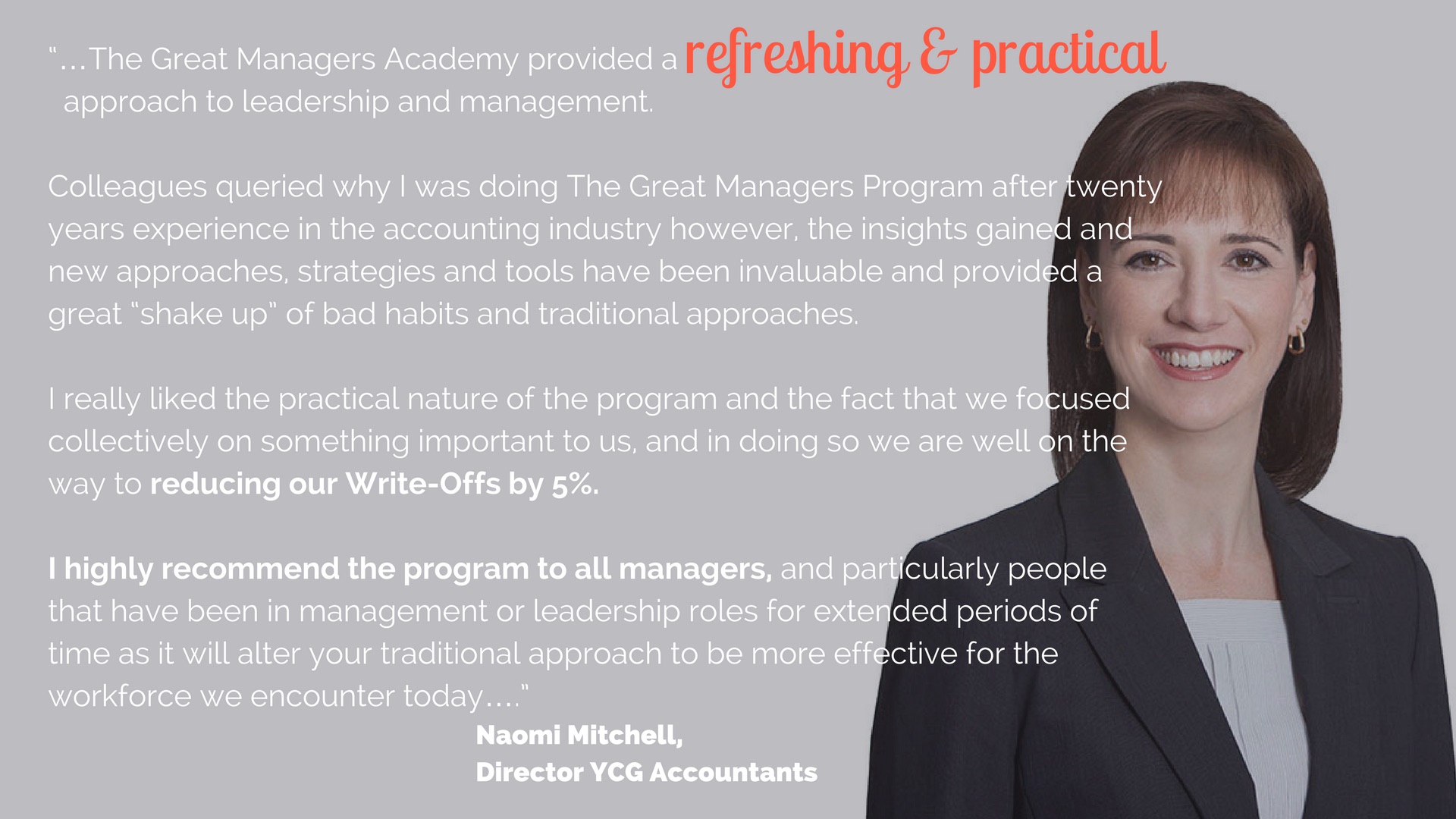Case Study: How a 30-Year Old Firm Improved Productivity & Reduced Write-Offs
The billable hours business model presents an array of challenges. When used well, it helps both organisations and clients understand how long work takes to complete and how to improve productivity. However, productivity issues can lead to unbilled hours and inefficiency. Here’s how one firm confronted those issues with Great Managers’ help…
Knowing how to improve productivity in a billable hours business model has several advantages. When done well, it leads to accurate billing, which keeps clients and Firm Partners happy.
Unfortunately, it’s not a foolproof model. There are an array of issues that can make it less workable. At their worst, these problems lead to productivity issues. These can result in conflicts between organisations and their clients. Your organisation may waste too much time, which leads to unbilled hours. Large organisations can lose millions of dollars every year because of this.
Often, these issues boil down to a lack of effective leadership skills. In particular, those who’ve worked under other business models may struggle with the billable hours business model.
Here’s how Great Managers helped a business that found itself in such a situation.
Case Study – YCG Accountants
Founded over 30 years ago, YCG Accountants offers a range of services. This includes financial planning, accounting, and auditing services. Plus, the firm offers consulting services to its clients.
The organisation has enjoyed tremendous success over the last three decades. It’s expanded rapidly and its client list has grown considerably.
But that growth also had some challenges.
The Challenge
YCG Accountants operates a billable hours business model. But as its client list grew, so too did the amount of work that it needed to track.
Unfortunately, this led to inefficiencies within the business. YCG Accountants found that its staff worked a lot of hours that were not being billed to clients. Productivity issues also led to wasted time, which made its services less efficient. This led to the organisation writing off a lot of the unbilled work which resulted in thousands of lost dollars.
YCG Accountants’ leaders recognised that something needed to change, starting with their leadership. But the leadership courses they’d found didn’t offer what they needed. A 3-day seminar may help with some issues in the short-term. But it won’t show you how to improve productivity in a billable hours business model.
That’s when they discovered Great Managers.
The Solution
Great Managers takes a different approach to the leadership challenges facing modern businesses. Instead of holding one-off seminars, we work in partnership with our clients. This helps us to understand the specific challenges that a business faces.
With us, YCG Accountants created a list of Key Performance Indicators (KPIs). Chief among these KPIs was the desire to reduce the organisation’s write-offs.
We centred our leadership development around that KPI. With Great Managers, YCG developed the effective leadership skills needed to boost productivity. Moreover, we focused their efforts on applying these new skills to achieve that KPI. By doing so, the firm saw significant improvement to its bottom line.
Finally, our training helped the YCG Accountants team get rid of the bad habits that had built up over the years. This is a common issue for well-tenured managers. You get so embroiled in the methods that worked before that you can’t figure out how to adapt and improve your workplace culture. We helped YCG Accountants create lasting behavioural and cultural change and understand how to improve productivity.
The End Result
We’ll leave it to YCG Accountants’ Director, Naomi Mitchell, to tell you about the results.
She says: “I really liked the practical nature of the program and the fact that we focused collectively on something important to us. And in doing so we are well on the way to reducing our write-offs by 5%.”
With us, YCG Accountants developed effective leadership skills and crucial management habits. They also learned how to apply these skills to its own business model. In doing so, made their processes more efficient, boosted productivity, and improved their bottom line.
The Key Challenges With a Billable Hours Business Model
You can cover the main challenges with the billable hours business model in the following categories:
- Staff working unbilled hours
- Wasted time
- Conflicts between organisations and their clients.
Let’s look at each individually.

Issue #1 – Staff Working Unbilled Hours
This is the major issue that YCG Accountants had to confront. The organisation worked hundreds of unbilled hours each year. That’s thousands of dollars that the firm couldn’t claim, despite putting in the time.
It’s not an issue that’s isolated to them either. Business software firm Accelo reveals some startling statistics. It says that the average organisation allows 735 hours of work to go unbilled each year. This number increases for larger firms.
But let’s take that 735 hours as a baseline. Imagine that your organisation charges $80 per hour. That’s a modest amount for many of you, but it serves the point well. With those numbers, your organisation loses $58,800 per year.
So many jobs fall into the unbilled hours category. For example, you may not bill for the time spent in meetings that overrun. Or, you may not charge for the time spent on admin like emails. Sometimes, you simply forget to log how long you spent on a piece of work. This leads to making estimates that generally err on the side of caution.
Here’s the point. Poor management of a billable hours business results in thousands of dollars of lost revenue.
Issue #2 – Poor Productivity
There are all sorts of productivity issues that waste time in a billed hours environment. The EY Australian Productivity Pulse provides more insight. It says that the average Australian wastes about 16% of the time that they spend at work. Such time sinks can include time spent on social media, emails, and waiting for technology to work.
But the biggest time waster is waiting on information from management. In fact, this issue accounts for 16% of all time wasted in Australian businesses.
A billable hours business model calls for high productivity. If you can’t offer that, you’ll struggle to maintain clients. They want to know what they’re paying for. If your organisational processes lead to wasted time, you’re left with unsatisfied clients.
Fixing this problem starts at the top. A leadership approach that doesn’t suit a billable hours environment causes issues. This leads to wasted time and more uncertainty about what you can and cannot bill for.
Issue #3 – Conflicts
When you combine working unbilled hours with wasted time, you get conflict. Organisations feel unhappy about the amount of labour cost they cannot bill for. Clients feel unhappy about getting billed for wasted time.
These conflicts sour the business relationship.
Eventually, the relationship breaks down. Your client leaves unhappy and will often tell others about the experience. This leads to poor word of mouth and clients becoming less willing to trust your organisation.
Such issues have a massive effect on your bottom line.
The Solutions
There’s no catch-all solution for driving efficiency in a billable hours environment. Each organisation faces different challenges that it needs to confront.
However, there are some general strategies that you can put into practice to improve productivity.
Strategy #1 – Emphasise Good Time Management
Good time management starts from the top of your organisation. If you can’t schedule your time accordingly, as a manager, your people struggle too.
Of course, managers face a lot of issues when it comes to time management. In fact, the average manager spends about three hours per day on interruptions.
These interruptions can derail your schedule if not properly managed.
Build a schedule that accounts for potential interruptions. Moreover, emphasise the importance of proper time management to your people. Provide concise instructions and help your people to prioritise their workloads. Ensure that they understand that wasting time costs the organisation money and causes issues with clients.
Strategy #2 – Maintain Timesheets
Unbilled hours often happen due to inaccurate recording of work. Employees may not log what they do in timesheets, which leads to a lot of estimation later on. As mentioned earlier, most businesses take a cautious approach with this. They estimate lower than the actual worked hours in order to keep their clients happy. In some cases, they write the work off entirely because they have poor records.
The key is to maintain accurate timesheets that log the time taken for every task. You can do this manually, but this adds another task to your day. Instead, consider investing in automated timesheet software. Such software packages automate the timesheet process and provide a more accurate account of the time spent on work.

Strategy #3 – Work With the Right People
The above strategies can help with immediate issues. But they don’t confront the unique issues that your business faces. Inefficiencies in your wider business processes cause productivity issues too.
A management seminar isn’t going to provide you with the tools needed to confront those issues. You may learn some interesting information. But you’ll often struggle to apply it in a billable hours environment.
Working with the right people solves that issue.
Ensure your training revolves around the issues that are unique to your organisation. Dig down into the problems that prevent you from operating well under the model. Then, search for people who can help you to confront those specific problems.
In the case of Great Managers, we ask clients to tell us the KPIs that are a high priority for them. The indicators that have the most drastic effect on their bottom line. We support them to solve issues relating to those KPIs and therefore create a long-term solution.
Avoid working with people who try to provide a solve-all solution. In many cases, their programs will not provide you with the skills you need before you can learn how to improve productivity in a billable hours environment.
The Final Word
A billable hours environment presents several challenges. Poor productivity leads to wasted time and unbilled hours. In the end, your business loses thousands, or even millions, of dollars over time.
A Great Manager knows how to improve productivity and can resolve these issues and drive efficiency up. In fact, a Great Manager can DOUBLE the capability of their people.
Focus on the following actions to improve productivity:
- Provide timely and concise instructions to your people
- Emphasise the importance of avoiding distractions, such as email and social media
- Keep accurate timesheets
- Work with people who can help you to confront specific issues
Great Managers can help with all of this.
Register for our next free webinar to learn how Great Managers improve productivity.









